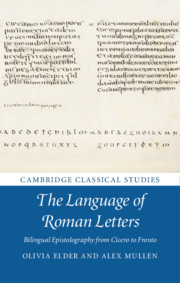Book contents
- The Language of Roman Letters
- Cambridge Classical Studies
- The Language of Roman Letters
- Copyright page
- Dedication
- Contents
- Tables
- Acknowledgements
- Abbreviations
- Chapter 1 Language and Life in Letters
- Chapter 2 A Roman Conversation? Code-Switching in Diachronic Context
- Chapter 3 Republic of Letters: The Politics of Cicero’s Epistolary Code-Switching
- Chapter 4 Imperial Relations: Greek and the lingua Romana of Fronto and Friends
- Chapter 5 The Language of Letters and Beyond: Greek in Suetonius’ Biographies
- Chapter 6 Weaving together the Threads: Epistolary Connections
- Appendix: Functions of the Code-Switches
- Bibliography
- Index
Chapter 2 - A Roman Conversation? Code-Switching in Diachronic Context
Published online by Cambridge University Press: 26 September 2019
- The Language of Roman Letters
- Cambridge Classical Studies
- The Language of Roman Letters
- Copyright page
- Dedication
- Contents
- Tables
- Acknowledgements
- Abbreviations
- Chapter 1 Language and Life in Letters
- Chapter 2 A Roman Conversation? Code-Switching in Diachronic Context
- Chapter 3 Republic of Letters: The Politics of Cicero’s Epistolary Code-Switching
- Chapter 4 Imperial Relations: Greek and the lingua Romana of Fronto and Friends
- Chapter 5 The Language of Letters and Beyond: Greek in Suetonius’ Biographies
- Chapter 6 Weaving together the Threads: Epistolary Connections
- Appendix: Functions of the Code-Switches
- Bibliography
- Index
Summary
Rochette’s comment reflects a scholarly view on code-switching in the two heavy-weights of Roman epistolography: Pliny’s Greek is thought to be technical, carefully delimitated and literary, whereas Cicero’s, at least at times, is considered to be freer and representative of spoken language.
Information
- Type
- Chapter
- Information
- The Language of Roman LettersBilingual Epistolography from Cicero to Fronto, pp. 40 - 110Publisher: Cambridge University PressPrint publication year: 2019
